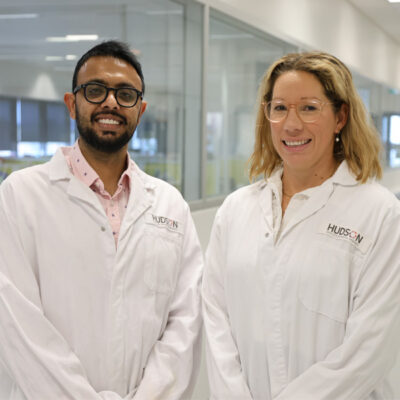Delivering hope: anti-inflammatory drug trial for preterm babies
By Rob Clancy, staff writer

When baby Blessing was born at just 25 weeks, her parents joined a drug trial they hope will benefit all preterm babies.
The trial focuses on anakinra, a drug that’s already used for inflammatory diseases in older children and adults, which neonatal specialists expect to assist preterm babies, given their risk of inflammation.
Hudson Institute Professors Claudia and Marcel Nold began the trial at Monash Children’s Hospital neonatal unit in 2021, building on their research published in Science Translational Medicine, in which they identified the specific inflammatory responses that drive illnesses of prematurity and revealed several risk factors both before and after birth.
Professor Marcel Nold, who is also is a consultant neonatologist at Monash Children’s Hospital and Professor of Paediatric Immunology at Monash University, says: “This new knowledge allows us to work on ways to control inflammation in preterm babies and prevent lifelong health problems.”
The same trial is now also underway in New Zealand, where baby Blessing is being cared for at the neonatal unit of Te Whatu Ora Starship Children’s Hospital at Te Toka Tumai Auckland by Dr Gergely Toldi.
Game-changer trial for preterm baby health
As a researcher at Waipapa Taumata Rau (University of Auckland’s Liggins Institute), Dr Toldi is leading Aotearoa’s (New Zealand) arm of the anakinra trial.
“Inflammation can lead to lung disease resulting in babies needing breathing support and additional oxygen for long periods of time, even beyond discharge from the neonatal unit,” he says.
“It can also cause bowel problems, which may necessitate surgery, as well as brain injury, leading to long-term developmental problems, and potentially resulting in disability.” – Dr Gergely Toldi
In the trial, anakinra is used daily for the first three weeks of the preterm babies’ lives.
Blessing’s mother, Virginia Vavau wanted to take part to help other preterm babies – and her own.
“This approach may be a game-changer in our clinical management of preterm babies,” says Dr Toldi. “Reducing the burden of complications arising from prematurity is a number one healthcare and socioeconomic priority, and this new treatment will hopefully do just that.”
Back in Australia, baby Max was the first participant in the anakinra trial, and you can find out more about his story in this video about Hudson Institute’s preterm birth research.
Collaborators | Te Whatu Ora Starship Children’s Hospital at Te Toka Tumai Auckland, Waipapa Taumata Rau, University of Auckland, Monash University’s School of Clinical Sciences, University of Auckland’s Liggins Institute
Journal | Science Translational Medicine
Title | Type 2 immune polarization is associated with cardiopulmonary disease in preterm infants
View publication | https://doi.org/10.1126/scitranslmed.aaz8454
In this article
About Hudson Institute
Hudson Institute’ s research programs deliver in three areas of medical need – inflammation, cancer, women’s and newborn health. More
Hudson News
Get the inside view on discoveries and patient stories
“Thank you Hudson Institute researchers. Your work brings such hope to all women with ovarian cancer knowing that potentially women in the future won't have to go through what we have!”






